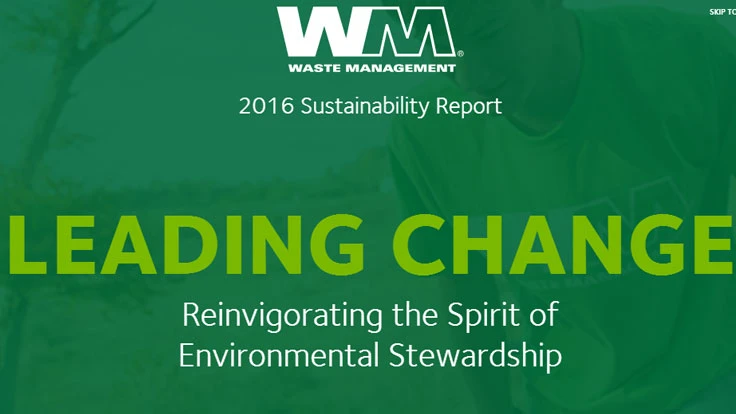
Waste Management, Houston, released its 2016 sustainability report titled Leading Change. The report highlights progress toward making recycling sustainable, reducing the company’s greenhouse gas footprint, keeping employees and communities safe and giving back to the communities it serves.
In the report, the company’s president and CEO, Jim Fish, highlights the important and growing focus on making recycling sustainable over the long term. “It’s time for recycling to evolve. We’ve started to see progress on this front, and steady progress is what we need—for the good times and the bad,” said Fish. “When we encounter roadblocks like those we’ve seen in our recycling business over the past few years, we see our role as leading change to overcome them.”
Additional 2016 report highlights include:
- Lowering emissions—In 2015, the company’s greenhouse gas (GHG)-reducing services—recycling, landfill renewable natural gas projects, landfill gas-to-energy projects and carbon sequestration in landfills—saved over three times the total greenhouse gas emissions its operations generated all year.
- Harnessing energy at the landfill—Waste Management’s landfill-gas-to-energy facilities power the equivalent of 470,000 households, offsets 2.5 million tons of coal per year and offsets 2.5 million tons of carbon dioxide emissions per year.
- Growing cleaner fleet—In 2015, the company operated more than 5,100 of natural gas vehicles.
- Recycling—Waste Management recycled and composted more than 14 million tons of materials from the waste stream in 2015. To adapt to recycling challenges, the company has worked to increase operational efficiencies and lower operating costs at recycling facilities; as well as work with customers, communities and environmental organizations across the country to get the word out on contamination and reinvigorate a spirit of environmental stewardship.
- Reducing waste—By working with myriad businesses and organizations, Waste Management helped create customized solutions that lower waste production, increase reuse and improve the recyclability of products.
The report also includes statistics on the company’s environmental performance, from fleet emissions to wildlife habitat protection to the variety of materials managed each year.
Latest from Waste Today
- Chiquita Canyon Landfill closes active waste disposal operations
- Highland Sanitation awarded solid waste and recycling contract in Wanamingo, Minnesota
- First NYC commercial waste zone is operational
- Portage, Michigan, launches food scraps recycling pilot program
- Colorado proposes new rules to curb landfill methane emissions
- Over 300 DSNY sanitation workers clean up confetti on New Year’s Eve
- Thinking about selling your waste business?
- Industry civil suit heading to trial in 2025





